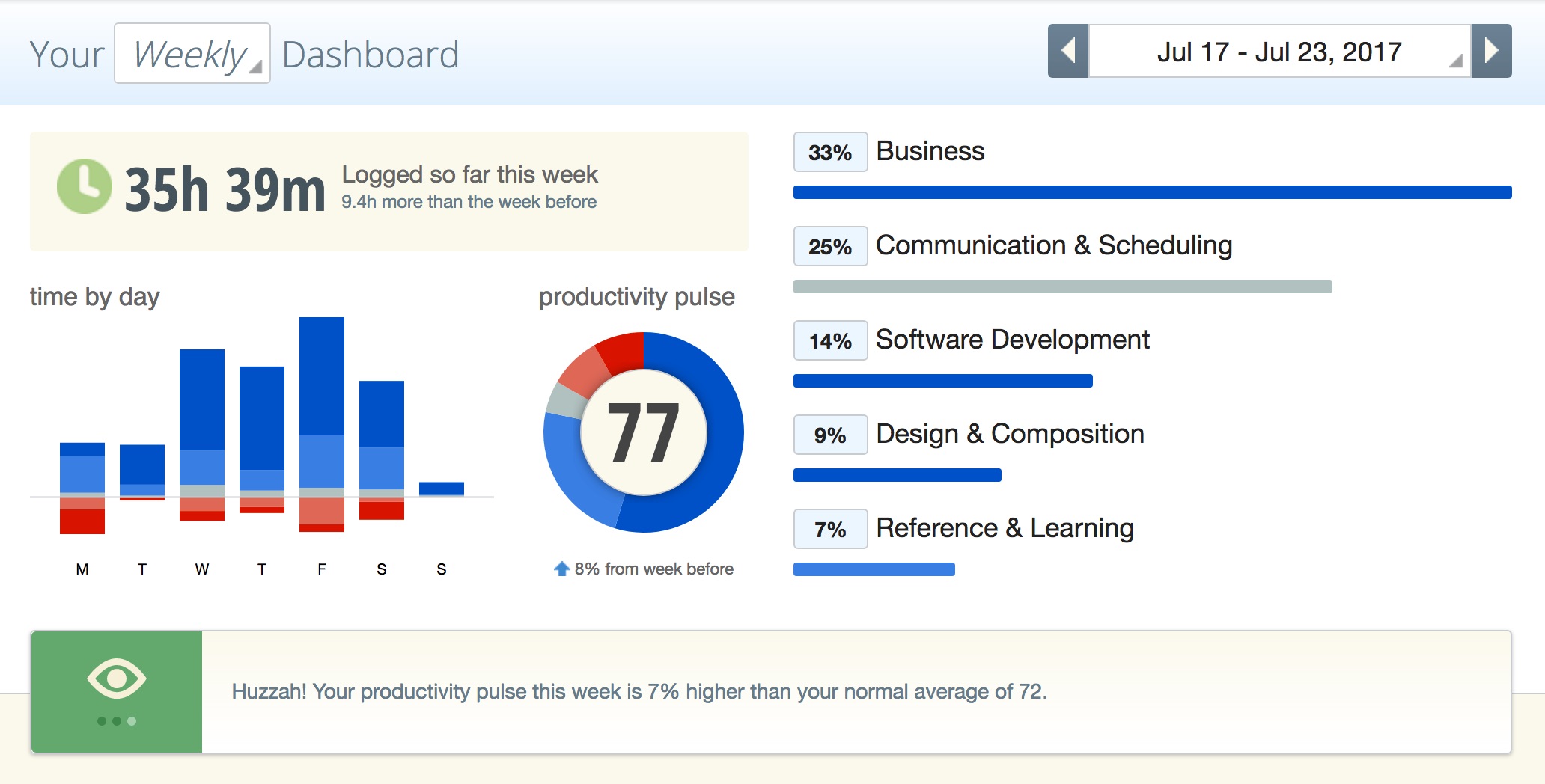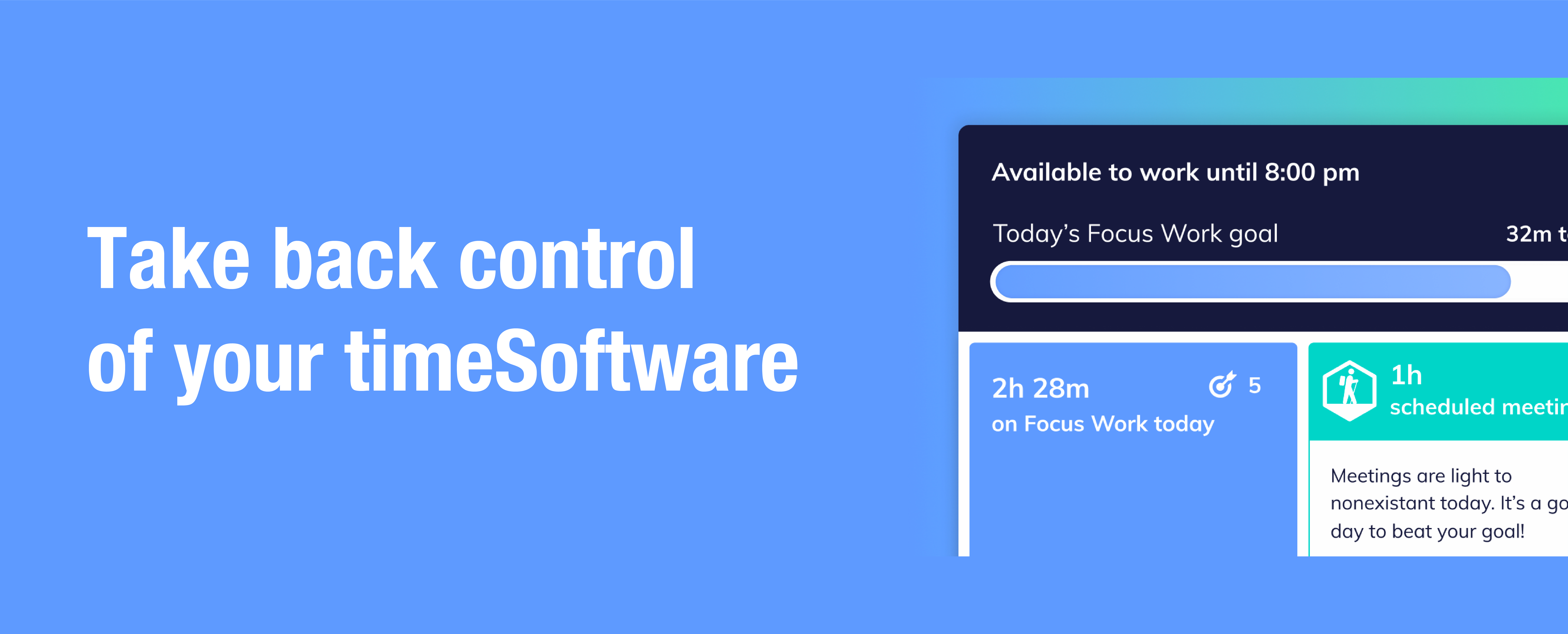
While building our new version, we decided that if our product really could do what we said it could do, we as a company should be able to switch to a 4-day (32 hour) work week. It's just as important to have space to be able to think creatively as it is to have focused time. We also know that it's normal for knowledge workers to spend 2 hours per work day on personal tasks or away from their computer. Our data even shows if you spend too much time on focused work without sufficient recharge time, you will burn yourself out. Most people believe that the average is a lot higher, and therefore assume it should be a lot higher for them, leading to stressful feelings of inadequacy. For example, our decade’s worth of data has taught us quite consistently that the average knowledge worker spends 2-3 hours a day in focused work activities on their computer.

We then help you navigate each day, alerting you when you're distracted, helping you protect focused work time, and letting you know when you can stop working for the day.

You fill out a survey that asks you questions like, “are you a manager or an individual contributor?” and, “how many hours are in your target work day?” and we match your answers against historical data to give you a personalized “Focus Goal”, taking into consideration meetings and your work week schedule. This has given us a vast and unique historical knowledge engine backed by statistics which we rely on to identify individual needs and give useful, personalized help. We have over a decade of experience analyzing millions of (anonymous and aggregated) users' work habits and the use patterns of applications and websites for work purposes. There's no one-size-fits-all way to achieve work/life balance. Our goal is to solve the pain that knowledge workers have about feeling overwhelmed, distracted, and unable to set healthy boundaries while working from their computers. Instead of weekly reports we give you daily forecasts, progress meters, nudges, and report cards. Unlike our original version, the new RescueTime is designed to be used every day. When most people started working remotely or from home, and with the world unlikely to revert to exactly the way it was before, we decided to rewrite RescueTime to reflect this new thinking. So although we started in the productivity/quantified-self space, we no longer think in terms of maximizing productivity. Over the years, we switched to fully remote work ourselves, and found it's more important to build good habits and set healthy boundaries than to measure where your time goes-we’ve seen how that can be counterproductive when it leads to lack of balance. We spent years perfecting the ability to help people understand where their time goes, but people often told us to help them work smarter, not harder. In 2008, we set out to answer the question, "where did my time go?" Those were the years of Web 2.0, and applications like Mint and Google Analytics were our inspiration. Although we got started back in W08, we’ve entirely rewritten our product to focus on wellness and balance in this new age of working from home, and it’s this new version I want to tell you about today. We help people who work on computers understand their time, be more focused, and feel less overwhelmed. There’s no need to write down your time on sheets of paper, or to input it into a log every hour-Rescue time tracks your work itself, and works on Apple, Windows, Chrome, Android, and iOS.My name is Brian Fioca and I’m the founder of RescueTime ( ).

RescueTime is a time tracking and management software, that integrates right into your browser. Let’s see if RescueTime is right for you in this review! What Is RescueTime?

Rescuetime cost how to#
This time-management tool wants to help you not only see how your day is spent, but also how to spend it better.
Rescuetime cost software#
So, while you could always read a time management book or take a course, an app or software can allow you to better measure and see what is happening with your time. But you can’t improve what you don’t measure. We all know that time management is a big problem. Our time slips away from us, without us intending it to. You have that big project to finish-but somehow, it never gets done. You planned to be productive today-but somehow, nothing was completed. Time is your most valuable resource-but sometimes it seems to disappear into thin air.


 0 kommentar(er)
0 kommentar(er)
